Lea Wait's Blog, page 38
May 24, 2024
Weekend Update: May 25-26, 2024
 Next week at Maine Crime Writers there will be posts by Charlene D’Avanzo (Monday) and Kait Carson (Tuesday) and it looks like we’ll be taking the rest of the week off. Have a great Memorial Day Weekend everyone.
Next week at Maine Crime Writers there will be posts by Charlene D’Avanzo (Monday) and Kait Carson (Tuesday) and it looks like we’ll be taking the rest of the week off. Have a great Memorial Day Weekend everyone.
In the news department, here’s what’s happening with some of us who blog regularly at Maine Crime Writers:
Matt Cost will be at the Isaac F. Umberhine Library in Richmond on Thursday, May 30th at 6:30 p.m. June slows down a bit, but this is a preview of what is coming!
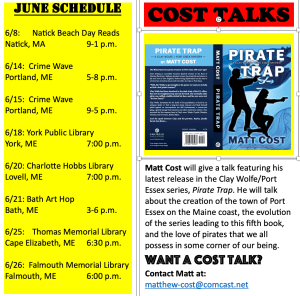
An invitation to readers of this blog: Do you have news relating to Maine, Crime, or Writing? We’d love to hear from you. Just comment below to share.
And a reminder: If your library, school, or organization is looking for a speaker, we are often available to talk about the writing process, research, where we get our ideas, and other mysteries of the business, along with the very popular “Making a Mystery” with audience participation, and “Casting Call: How We Staff Our Mysteries.” We also do programs on Zoom. Contact Kate Flora
Where the Research Takes You by Matt Cost
I truly enjoy every aspect of writing, which is a much more complex project then just sitting down and spitting out words. The different hats that must be worn are that of creating an idea, researching, writing, editing, marketing, and promoting. I am often doing all of these at the same time on various books. Right now, I am researching and writing EveryThing VS Max Creed, editing 1955 and soon, Mainely Mayhem, marketing City Gone Askew, and promoting Pirate Trap.


Today, I want to confabulate about research, a piece of the writing process that I greatly enjoy. This is intertwined with my love of history, my major at Trinity College, and my vocation for ten years as a teacher at Brunswick Junior High School. My first written book was I am Cuba, the first draft completed in 1991, before being eventually my first traditionally published book in 2020. Only 29 years.
One big reason for the holdup and passage of time was the need to visit Cuba, a key component in research when writing about a place you are not familiar with. In 2016, I got the opportunity to travel to Cuba on a self-devised tour following the revolutionary war trail of Fidel and his bearded guerillas. I flew into Santiago with my son the day after Fidel was buried in the Santa Ifigenia Cemetery in that city. High in the Sierra Maestra outside of Santiago was where the revolution began. We traveled up to his command post, kept exactly like it was in the 1950s, helping understand how 300 rebels defeated an army of 10,000 trained soldiers in a key battle. We toured key battle spots in Santiago and then traveled across the island nation following the revolutionary war trail as the rebels marched on Havana defeating the government forces along the way.
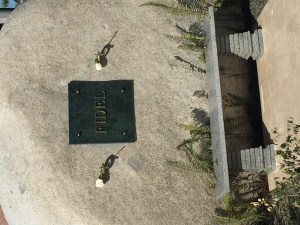
Similar research mixed with pleasure trip was taken with my wife as we explored New Orleans for Love in a Time of Hate, which was set in that city in the 1870s. For almost two weeks, by day, we researched key street battle spots as the war for Civil Rights and Social Equality raged in actual armed conflicts upon the streets of New Orleans. As well, we met with and spoke with the foremost expert on the Voodoo Queen, Marie Laveau, visited plantations, dug into museums, and gained an understanding of New Orleans, both then and now. And then, by night, we went out for drinks, food, and music. It seemed our journey back to our quarters each night was marred by ‘just one more stop’ as live bands pulled us into their clutches as we tried to pass by.
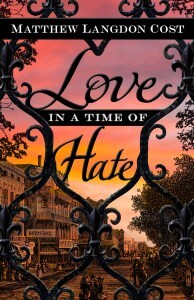
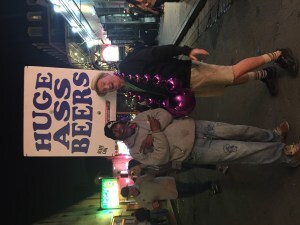
One reason to set my Brooklyn 8 Ballo series in Brooklyn was that my daughter lives there, giving me an opportunity to do research whenever I visit. Two memorable trips include a trip to the back room of the Back Room and a visit to Roosevelt Island formerly known as Damnation Island.
The Back Room is a speakeasy in lower Manhattan that has been kept exactly like it was in 1924 when 8 Ballo pays a visit there and is escorted into the back room of the Back Room to meet with Charlie “Lucky” Luciano, Meyer Lansky, and Bugsy Siegel. It is here that they spawned the organization known as Murder Incorporated and laid the foundation for the modern Mafia. Due to my daughters’ efforts, we were given a private tour of this back room to the Back Room.


In 2024, Roosevelt Island, a spit of land two miles by a half mile, located in the East River between Manhattan and Queens, is an upscale neighborhood with a bridge from Queens and a tram that takes you to Manhattan. One-hundred-years ago, in 1924, it was known as Damnation Island because it was a dumping ground for the poor, sick, mad, and criminal. A combination of insane asylums, Almshouses, prisons—for the poor, it was reached by taking an elevator down from the Queensboro Bridge.
Whether it is reading current or old newspapers, books, internet stories, visiting locations, or any one of a myriad of various techniques, research is an integral part of the writing process. What research methods have you used or been impressed with in your writing or reading?
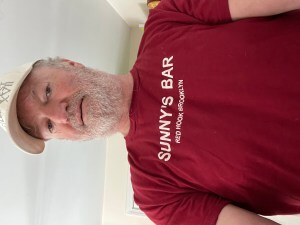
About the Author
Matt Cost was a history major at Trinity College. He owned a mystery bookstore, a video store, and a gym, before serving a ten-year sentence as a junior high school teacher. In 2014 he was released and began writing. And that’s what he does. He writes histories and mysteries.
Cost has published five books in the Mainely Mystery series, with the fifth, Mainely Wicked, just released in August of 2023. He has also published four books in the Clay Wolfe Trap series, with the fifth, Pirate Trap, just released on March 27th, 2024.
For historical novels, Cost has published At Every Hazard and its sequel, Love in a Time of Hate, as well as I am Cuba. In April of 2023, Cost combined his love of histories and mysteries into a historical PI mystery set in 1923 Brooklyn, Velma Gone Awry. City Gone Askew will follow in July of 2024.
Cost now lives in Brunswick, Maine, with his wife, Harper. There are four grown children: Brittany, Pearson, Miranda, and Ryan. A chocolate Lab and a basset hound round out the mix. He now spends his days at the computer, writing.
May 22, 2024
Plowing the Slow Straight Furrow
One of my infallible signs of spring is when I’m out on my morning meander and first smell skunk. The wet weather dampens the force of it but adds a thickness that holds the scent in the air. I might never see the skunk, but I always know one has been there.
The first third of this year sped downhill like I was a ten year old boy on a bike, wobbling and terrified, but as I emerged into May, I realized I didn’t feel like I’d gotten much done, personally or creatively.
For the longest time, I’ve told myself I have to write every day, that a story or a novel has a momentum you risk if you don’t maintain it. I’ve always been disciplined about my writing time, either counting hours when I’m not sure where the story is going, numbers of words or pages once I’m launched or if I’m revising or editing. Like a baseball player, I have routines and rituals and talismans designed to keep me working. But in the noise and the chaos of the current month, I realize that, like every other living thing, I have seasons.
I once attended a writing workshop with J. A. Jance, where she opined that a person’s creative energy probably topped out at about the length of time it takes for two well-matched people to play a game of chess. I am starting to wonder, in my near-dotage, if a rigid discipline is the best use of a limited supply of creative energy.
So I’m starting to play with what my seasons might be, whether the winter is the best time to dig deep for my work, the spring and summer a time to breathe, live outdoors, connect with the world.
I’ve loosened the self-imposed bonds more than I have been willing to, taking a day off here or there, putting in extra time when I have some unexpectedly.  My level of productivity worries me less now than I worry about being too rigid, about missing a good story or poem or essay idea because I’m too busy plowing my slow straight furrow.
My level of productivity worries me less now than I worry about being too rigid, about missing a good story or poem or essay idea because I’m too busy plowing my slow straight furrow.
Oh, the slow straight furrow. In 1983, Anne and I took counseling from an Episcopal minister in Peterborough, New Hampshire, prefatory to our marriage the next year. In conversation, said cleric opined that I was the type to “plow a slow straight furrow.”  Not liking the idea of being told who I was or what I was like, I resisted the idea. But everything I’ve learned about myself since then has taught me I’m a linear type, inclined to an excessive rationality and a focus on one thing at a time.
Not liking the idea of being told who I was or what I was like, I resisted the idea. But everything I’ve learned about myself since then has taught me I’m a linear type, inclined to an excessive rationality and a focus on one thing at a time.
But spring is also the time for change. And if I can believe in a skunk I cannot see, can’t I believe in my own change?
What Spreads Beyond the Place Where It Started?
Sandy Neily here:
Cancer and rampant real estate development. Both are driven by relentless metastasis, a word usually reserved for the spread of cancer.
 Here’s the medical definition: metastasis is when the cancer spreads beyond the place where it started to other areas of the body.
Here’s the medical definition: metastasis is when the cancer spreads beyond the place where it started to other areas of the body.
There is no metastasis-like definition for rampant real estate development, but it most often behaves like rampant, out-of-control cancer cells.
Maybe author Edward Abbey says it better when he writes about the loss of our wild world
“Growth for the sake of growth is the ideology of the cancer cell.”― Edward Abbey
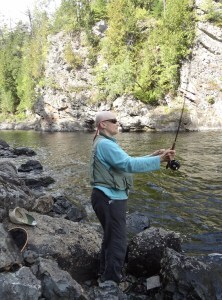
Casting while bald
This is a hard topic for me. I have also lived with so much loss of the outdoors that sometimes I’m not sure I can write about it in an entertaining way. I want to create a page-turning read and treat readers to what’s compelling, engaging, and mysterious. And I must also infuse an unfamiliar journey made up of a unique plot and unfamiliar places with familiar human emotions and experiences or the story cannot resonate with a potential reader.
Whew.
How to do that? How to connect the cancer we do know from our own or loved ones’ experience with a similar relentless process that, unchecked, can destroy the “body” of our planet— destroy the woods, waters, and wildlife habitat that is essentially our home?
Here’s an excerpt from “Deadly Harvest” (always a work in progress) where Patton, the narrator, returns home only to find the woods has changed.
***************
Something wasn’t right. It was late March and I’d only been away since last fall. I’d walked these woods for over fifty years. No signs warned me about anything except normal animal activity. Turkeys left scratched ground after they’d found insect dinners. Overturned clumps of leaves told me I’d surprised a deer. Torn-up mud holes said a male moose had rolled in female urine to advertise his availability. Pock and I avoided moose-churned mud because horny moose charged any moving thing.
None of these creatures posted No Trespassing signs, nailed up surveillance cameras, or wrapped the woods with bright pink flagging tape.
**************
When I get stuck, I turn to articulate, inspirational voices that shove me forward, encourage me, renew my resolve, help me manage my grief. Yes, there is grief. People all over the world are starting to hold funeral ceremonies for places they have lost. Perhaps most of us carry around memories of loved lost places.
I think my novels may be a call to action as well as an obituary at the same time, but I do have some help.
Some of my helping voices.
“If a man walks in the woods for love of them half of each day, he is in danger of being regarded as a loafer; but if he spends his whole day as a speculator, shearing off those woods and making the earth bald before her time, he is esteemed an industrious and enterprising citizen.”
― Henry David Thoreau
“Better a cruel truth than a comfortable delusion.”
“Since we cannot expect truth from our institutions, we must expect it from our writers.”
“Society is like a stew. If you don’t stir it up every once in a while then a layer of scum floats to the top.”
“I stand for what I stand on.”
― Edward Abbey
“To those devoid of imagination, a blank place on the map is a useless waste; to others, the most valuable part.”
“One of the penalties of an ecological education is that one lives alone in a world of wounds…”
Aldo Leopold , A Sand County Almanac: With Other Essays on Conservation from Round River
“We stand now where two roads diverge. But unlike the roads in Robert Frost‘s familiar poem, they are not equally fair. The road we have long been traveling is deceptively easy, a smooth superhighway on which we progress with great speed, but at its end lies disaster. The other fork of the road — the one less traveled by — offers our last, our only chance to reach a destination that assures the preservation of the earth.”
“The question is whether any civilization can wage relentless war on life without destroying itself, and without losing the right to be called civilized.”
“The ‘control of nature’ is a phrase conceived in arrogance, born of the Neanderthal age of biology and philosophy, when it was supposed that nature exists for the convenience of man.”
― Rachel Carson
“If we kill off the wild, then we are killing a part of our souls.”
“I think my message to the politicians who have within their power the ability to make change is, ‘Do you really, really not care about the future of your great-grandchildren? Because if we let the world continue to be destroyed the way we are now, what’s the world going to be like for your great-grandchildren?’”
Jane Goodall
“Destroying rainforest for economic gain is like burning a Renaissance painting to cook a meal.”
“The most dangerous worldview is the worldview of those who have not viewed the world.”
― Edward O. Wilson, Half-Earth: Our Planet’s Fight for Life
“Earth provides enough to satisfy every man’s need, but not every man’s greed. ”
“What we are doing to the forests of the world is but a mirror reflection of what we are doing to ourselves and to one another.”
― Mahatma Gandhi 
“God has to nearly kill us sometimes, to teach us lessons.”
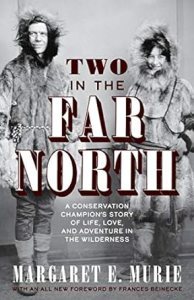
Margaret is known as the “Grandmother of the Conservation Movement.” Read this book!
“These temple destroyers, devotees of ravaging commercialism, seem to have a perfect contempt for Nature, and, instead of lifting their eyes to the God of the mountains, lift them to the Almighty Dollar.”
― John Muir
“Wilderness itself is the basis of all our civilization. I wonder if we have enough reverence for life to concede to wilderness the right to live on?” –Margaret (Mardy) Murie
 “Finding beauty in a broken world is creating beauty in the world we find.”
“Finding beauty in a broken world is creating beauty in the world we find.”
Our kinship with Earth must be maintained; otherwise, we will find ourselves trapped in the center of our own paved-over souls with no way out.”
Terry Tempest Williams,
Let’s let Edward Abby have the last word here and let’s get out there …

“Devoted though we must be to the conservation cause, I do not believe that any of us should give it all of our time or effort or heart. Give what you can, but do not burn yourselves out — or break your hearts. Let us save at least half of our lives for the enjoyment of this wonderful world which still exists. Leave your dens, abandon your cars and walk out into the great mountains, the deserts, the forests, the seashores. Those treasures still belong to all of us. Enjoy them to the full, stretch your legs, expand your lungs, enliven your hearts — and we will outlive the greedy swine who want to destroy it all in the name of what they call GROWTH.
God bless America — let’s save some of it. Long live the weeds and the wilderness yet!”
― Edward Abbey, Postcards from Ed: Dispatches and Salvos from an American Iconoclast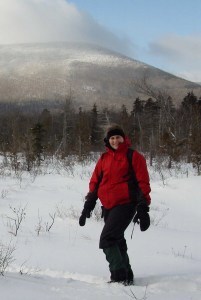
ps: Go here to see how much of Maine’s genuine habitat remains (what’s green). MAINE FOREST EDGE EFFECTS (1)
Sandy’s 2nd Mystery in Maine, Deadly Turn, was published in 2021. Her debut novel, “Deadly Trespass, A Mystery in Maine,” won a national Mystery Writers of America award, was a finalist in the Women’s Fiction Writers Association “Rising Star” contest, and was a finalist for a Maine Literary Award. Find her novels at all Shermans Books (Maine) and on Amazon. Find more info on Sandy’s website.
May 19, 2024
Summertime, and the supporting Maine authors is easy
I often hear from readers about how they they really like to support local authors. Thanks! We appreciate it. And guess what? This time of year is the best time for readers in Maine to get out and support local authors who they love, as well as to find new ones. Yes, there are author events in the other seasons, but when the nice weather [theoretically] ramps up, so do the opportunities to catch Maine authors doing what the do second-best [after writing, of course], which is talking to you about writing, books, Maine and everything else.
I know! You’re busy. Very busy! There’s the lawn and the kids and the porch and the visitors from away and the ice cream and the lake and the lobster and the beach and the cozy sunsets and the camping and the garden and that part of the state you’ve never been to but vowed to drive to when the weather was okay and the [if we’re lucky] a few short months to do it all in. Good news! Author events don’t have to be a chore that you wedge into an otherwise fun schedule. Your local library or craft fair likely has some Maine authors scheduled. Or the place you’re visiting does. Come on! We are a fun bunch and we are always happy to see you.
If you’ve never been to an author panel or author talk at your local library, how about checking one out? They are free of charge, usually are about 90 minutes long. Frequently, light refreshments are served. It’s fun to meet authors and listen to what they have to say. You can bring the kids, bring the old folks, bring the visitors from away. You’ll also be showing some love for your library.
I love doing library events — I wouldn’t be a writer if it weren’t for the excellence of the local libraries I spent so much time in as a kid, first taken there by my mother, then on my own. [In particularly, major shout-out to Augusta’s fantastic Lithgow Public Library, where I’d devoured the entire mystery section by the time I was 16.]

Maine Crime Writer Jule Selbo, standing, with camera, takes a photo of Dick Cass, far left, as the crowd gathers before a Making Your Own Mystery event at the South Portland Public Library in February. Library events pick up in the summer, and are a great way to support Maine authors and the libraries that made us. (Photo by Maureen Milliken, third author on the panel).
Participating in a library author talk or other event is pretty low-effort on your part. All you have to do is show up. Not only will the author appreciate it, but successful events help libraries stay in the good graces of the municipal government that funds the library. Having lived in a town where the library was under threat of being closed down for several years, I can assure you it’s not just hyperbole on my part. As an author, when only a few people show up for an event, I charge right ahead, full speed. I don’t feel bad for myself, but I do feel bad for the librarian who put so much time and effort into making the event happen.
I don’t mean to guilt-trip you! You should go because you want to. You’re interested, you want to support local authors and you want to support your library. You are not required to ask a question. You are not required to buy a book [though if the feeling moves you, we appreciate it]. It’s free. And THERE ARE OFTEN LIGHT REFRESHMENTS.
An even less commitment-heavy way to support local authors during the summer and early fall months is to check out local craft, art and literary fairs, where authors often have a table. There’s no pressure. You don’t have to be there at a certain time. You can leave when you want. There are other things to see, too, and other creators to support. You’re responsible for your own light refreshments, though I do know of at least one author, who will remain nameless but her initials are KF, who usually has a bowl of free candy on her table.
When we have a table at these events, we’re honestly just happy that people come by and chat, and pick up some bookmarks or other free material. No pressure to buy a book. If you do want to support local authors, though, buying a book [or two] is a great way to do it.
Buying a book directly from an author at an event not only usually gets you a signed book, but the author also makes a little more money than they do when you buy one on Amazon or at a store.

Maine Crime Writers Matt Cost, Kate Flora, Maureen Milliken and John Clark at the Belgrade Village Green Craft Fair in June last year. The authors donated some of their proceeds to the Friends of the Belgrade Public Library.
Not that we don’t also love bookstores and book sellers! You can support both indie book sellers and local authors by buying from Maine book stores. Don’t worry if the store doesn’t have the book or author you’re looking for in stock — they may be able to order it from their distributor. Many local booksellers now also have online stores where you can find books that aren’t on their shelves from the comfort of your smart phone or laptop place.
Don’t want to buy a book? You can also ask your local library to order books from your favorite author. Or you can get them through an intra-library loan.
We don’t mind if you borrow our books from the library, rather than buying it. Or even read one handed down from a friend or family member. Because the best way to support local authors is to read their books. If you read them, and enjoy them, tell your friends and family. That’s also a great way to support local authors. That word of mouth is gold.
And, as KF says, “Books make great gifts.”
Maine Crime Writers list some of the events we have coming up in our weekly update blog post, which comes out on Saturday morning. You can also find events on authors’ Facebook pages and websites, the Maine Crime Writers Facebook page, your local newspaper listings, your library’s social media, and everywhere else stuff like this is posted.
What do I have going on this summer? Thanks for asking! Here’s the schedule so far:
Tuesday, JULY 9, 6 p.m., Tuesday, Topsham Public Library, 25 Foreside Road, Topsham, I’ll be participating in a Casting Call panel with fellow Maine Crime Writers Kate Flora, Vaughn Hardacker and John Clark. We’ll talk about how different writers choose the attributes of their characters – the victim, the sleuth, and the villain – along with additional characters such as sidekicks, alternative suspects, witnesses, and others who fill out the cast.
Friday, JUNE 21, JULY 19 and AUGUST 16, I’ll be sharing a table with fellow Maine Crime Writer Kate Flora, 4-7 p.m., at the Bath Art Hop, downtown Bath.
Friday, JULY 12, AUGUST 9 and SEPTEMBER 13, I’ll be sharing a table with fellow Maine Crime Writer Kate Flora, 4-7 p.m., at the Brunswick Art Walk, downtown Brunswick.
AUGUST 25-26 – I’ll have a table at Maine BookFest, Saturday and Sunday, Head of Falls, Waterville, Maine. On one of those days, I’ll share with Kate Flora, and on the other, I’ll be sharing with another great Maine author. More information coming soon.
One final note: Be sure to keep an eye out for the fourth in my Bernadette “Bernie” O’Dea mystery series, DYING FOR NEWS, coming out late summer or early fall. What’s that? You haven’t read the first three? Well, summer is a great time of year to catch up on some good mystery reading, too. Check out my website, maureenmilliken.com, or hunt me down and we can discuss that in person.
May 17, 2024
Weekend Update: May 18-19, 2024
 Next week at Maine Crime Writers there will be posts by Maureen Milliken (Monday), Sandra Neily (Tuesday), Dick Cass (Thursday) and Matt Cost (Friday).
Next week at Maine Crime Writers there will be posts by Maureen Milliken (Monday), Sandra Neily (Tuesday), Dick Cass (Thursday) and Matt Cost (Friday).
In the news department, here’s what’s happening with some of us who blog regularly at Maine Crime Writers:
Matt Cost was excited to have a cover reveal of his upcoming release of City Gone Askew, book 2 in the Brooklyn 8 Ballo series.
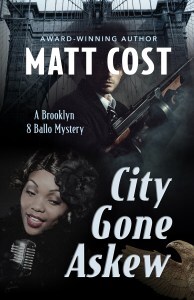
What is happening at Cold Spring Harbor with Herman Wall and the eugenics movement? Who are the mysterious Germans threatening 8? And what is the identity of the charismatic Grand Cyclops? 8 must race against time to uncover the truth and put a stop to the most chilling triumvirate ever conceived.
COST TALKS continue this week. Matt will be at the Mystery KensiCon Conference on a thriller panel today, Saturday, at the Langley-Adams Library in Groveland, MA, and will be signing books from 10-3. Sunday is The Grande at South Portland for senior living. Monday, Matt gets to stay in Brunswick at the Rotary Club at high noon. Tuesday finds Matt trekking all the way up to the Southwest Harbor Public Library for his talk on the evolution of a book at 5:30 p.m. And then Wednesday, he will be signing books for the grand opening of Barnes & Noble in South Portland from 1-3 p.m. Come say hi. Buy a book. Write on.
An invitation to readers of this blog: Do you have news relating to Maine, Crime, or Writing? We’d love to hear from you. Just comment below to share.
And a reminder: If your library, school, or organization is looking for a speaker, we are often available to talk about the writing process, research, where we get our ideas, and other mysteries of the business, along with the very popular “Making a Mystery” with audience participation, and “Casting Call: How We Staff Our Mysteries.” We also do programs on Zoom. Contact Kate Flora
May 16, 2024
Once Again the Body is Face Down
Kaitlyn Dunnett/Kathy Lynn Emerson here, today blogging as Kathy.
Well, here we go again. The newly edited trade paperback of the second book my Face Down historical mystery series, featuring Susanna, Lady Appleton as the amateur detective, is now available. The idea is for all ten novels to be in print by the end of January 2025 and, at least on my end, everything is progressing right on schedule.
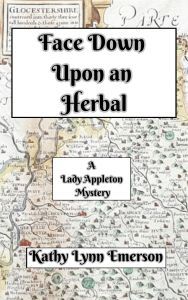 Face Down upon an Herbal takes place two years after Face Down in the Marrow-Bone Pie, in 1561. Susanna Appleton is a gentlewoman who just happens to be an expert on poisonous herbs. Shortly after the last murder, she published a book (A Cautionary Herbal) to warn people which plants to avoid. It was published anonymously because her husband, Sir Robert Appleton, doesn’t approve of women authors, and unbeknownst to Susanna, he’s been taking credit for it himself. As this story opens, he’s in Scotland on a mission for Queen Elizabeth and the queen has a task for Susanna as well. She’s sent to assist a noblewoman, Lady Madderly, with an herbal she’s been writing. Accompanied by her young kinswoman, Catherine, Susanna travels to Madderly Castle in Gloucestershire, where the Yuletide season is just getting under way and where a Scots lord has recently been murdered. When Susanna learns that he was found face down upon a copy of her book, she feels a personal obligation to solve the crime.
Face Down upon an Herbal takes place two years after Face Down in the Marrow-Bone Pie, in 1561. Susanna Appleton is a gentlewoman who just happens to be an expert on poisonous herbs. Shortly after the last murder, she published a book (A Cautionary Herbal) to warn people which plants to avoid. It was published anonymously because her husband, Sir Robert Appleton, doesn’t approve of women authors, and unbeknownst to Susanna, he’s been taking credit for it himself. As this story opens, he’s in Scotland on a mission for Queen Elizabeth and the queen has a task for Susanna as well. She’s sent to assist a noblewoman, Lady Madderly, with an herbal she’s been writing. Accompanied by her young kinswoman, Catherine, Susanna travels to Madderly Castle in Gloucestershire, where the Yuletide season is just getting under way and where a Scots lord has recently been murdered. When Susanna learns that he was found face down upon a copy of her book, she feels a personal obligation to solve the crime.
There are cheaper e-book and used copies out there, with texts that aren’t all that different from the newest versions (although I personally believe my recent edits have made them better reads), but I’m hoping these reissues will appeal to collectors, and to folks who prefer physical books to reading on a tablet or phone, and that print-on-demand will keep the titles readily available for many years to come. They won’t automatically appear on brick-and-mortar bookstore shelves or in libraries, but any bookstore or library can easily order copies.
 There is, however, one large and annoying speed bump interfering with my master plan. Like it or not, the average reader goes first to Amazon to search for a book, and for some time now, Amazon has been going out of their way to mess with the prices and availability of independently published books. Face Down in the Marrow-Bone Pie was published on April 6, 2024. On April 11, it was listed in stock for $25.17 (the price I set was $15.99) with free delivery by April 23-May 2, but the seller was not Amazon. Rather it was one of their “other sellers”—All Time Fans (only a 77% positive rating). When I checked again on April 19, All Time Fans had been relegated to its proper “other sellers” slot, but Amazon claimed “This title has not yet been released” and offered free delivery of a $15.99 paperback by October 29, 2024! A little later the delivery date moved up to November 20. When I checked on May 11, things had changed yet again. There were “only 10 left in stock” for $17.55 plus $3.99 shipping, shipped by Amazon and delivered by May 20-24, but coming not from Amazon but from SuperBookDeals (85% positive ratings). Four “new and used” offers were also listed under “other sellers on Amazon” but—surprise! surprise! they were the Amazon offer from SuperBookDeals, another offer direct from Super Book Deals ($17.55), the one from All Time Fans ($25.17), and the previous Amazon pre-order offering (to be delivered by November 20) for $15.99. What a deal!
There is, however, one large and annoying speed bump interfering with my master plan. Like it or not, the average reader goes first to Amazon to search for a book, and for some time now, Amazon has been going out of their way to mess with the prices and availability of independently published books. Face Down in the Marrow-Bone Pie was published on April 6, 2024. On April 11, it was listed in stock for $25.17 (the price I set was $15.99) with free delivery by April 23-May 2, but the seller was not Amazon. Rather it was one of their “other sellers”—All Time Fans (only a 77% positive rating). When I checked again on April 19, All Time Fans had been relegated to its proper “other sellers” slot, but Amazon claimed “This title has not yet been released” and offered free delivery of a $15.99 paperback by October 29, 2024! A little later the delivery date moved up to November 20. When I checked on May 11, things had changed yet again. There were “only 10 left in stock” for $17.55 plus $3.99 shipping, shipped by Amazon and delivered by May 20-24, but coming not from Amazon but from SuperBookDeals (85% positive ratings). Four “new and used” offers were also listed under “other sellers on Amazon” but—surprise! surprise! they were the Amazon offer from SuperBookDeals, another offer direct from Super Book Deals ($17.55), the one from All Time Fans ($25.17), and the previous Amazon pre-order offering (to be delivered by November 20) for $15.99. What a deal!
Barnes & Noble online has listed the book at the price I set from the start.
Do I expect better from Amazon for Face Down upon an Herbal? Let’s just say I’m not holding my breath. The book was published May 9. On May 11, Amazon listed it with the correct price and with free delivery to Prime members, but flagged it “Temporarily out-of-stock.” In other words, order at your own risk.
It is available at Barnes & Noble online. Here’s the link if anyone is interested.
 Undaunted, I’ve already edited and scheduled the third entry in the series, Face Down Among the Winchester Geese, for release on June 6, 2024 and I’m currently proofreading number four, Face Down Beneath the Eleanor Cross.
Undaunted, I’ve already edited and scheduled the third entry in the series, Face Down Among the Winchester Geese, for release on June 6, 2024 and I’m currently proofreading number four, Face Down Beneath the Eleanor Cross.
For those who prefer e-books, the entire series, plus the short stories featuring the same characters, is already available in a three volume collection. That text was lightly edited from the original single-title print and e-book versions but I have done and am doing more minor edits (catching typos and inconsistencies) before releasing each new trade paperback. The plot and characters are unchanged.
Back in the day, when I regularly attended fan conventions, I was known as “the Face Down lady.” That’s not a bad way to be remembered.

Kathy Lynn Emerson/Kaitlyn Dunnett has had sixty-four books traditionally published and has self published others. She won the Agatha Award and was an Anthony and Macavity finalist for best mystery nonfiction of 2008 for How to Write Killer Historical Mysteries and was an Agatha Award finalist in 2015 in the best mystery short story category. In 2023 she won the Lea Wait Award for “excellence and achievement” from the Maine Writers and Publishers Alliance. She was the Malice Domestic Guest of Honor in 2014. She is currently working on creating new omnibus e-book editions of her backlist titles. Her website is www.KathyLynnEmerson.com.
Heard the one about the farmer’s daughter?
Kate Flora: From time to time, a casual conversation with friends will remind me how
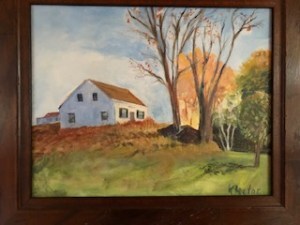
The farmhouse on Sennebec Hill, painting by Karin Rector
different it is to have grown up on a Maine farm, actively tied to the seasons and the production of food. Yes, we got some of our food from grocery stores, but what we could raise ourselves, we did.
In the hilltop farm, spring meant all the counters, desktops, windowsills, and part of the floor would be covered with plants being raised from seed. New varieties would be carefully chosen from the seed catalogues that arrived in January. A shorter growing season? Better resistance to pests? Summer meant long evenings spent at the table after dinner, processing produce for canning and freezing, an activity that connected us to earlier times, when processing food was the only way people ate in the winter. Our parents’ city friends, who came to Maine in the summer, would join us snapping beans and pitting cherries.
Summer meant getting the daily chore lists, neatly typed by my mother, listing the tasks that had to be completed before we would be allowed to go down to the lake to swim. Weeding was high on that list. I don’t recall whether another task was picking the potato beetles off the plants, but likely it was. When my boys were little, their grandmother made it a special treat for them to hunt down those bugs and drop them into cups of soapy water.
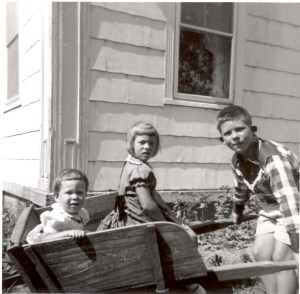
Clark children: John, Kate and Sara
Over the summer, the shelves of canned good would fill, carefully processed in the pressure cooker. Because my mother was always afraid it would, literally, blow a gasket, we were sent away for our safety while it was doing its thing. I grew up with a great respect for pressure cookers.
Fall meant that pails of squash, potatoes, and onions were stored in the cement or dirt-floored cellar for the winter. There would be shell beans waiting to dry so they could be shelled, cooked, and canned. Newspapers would be spread on the floor of the summer kitchen to hold squash and any tomatoes that could be rescued from the frost. It was also apple stealing time, when we would drive back roads to find abandoned farms where apple trees still produced. My mother told us that you couldn’t make an apple pie without at least five kinds of apples.
Come January it would all begin again.
 That way of growing up connected me to the natural world. And there is no time I feel that connection more than in the spring. In spring, I make myself leave the desk, go outside, and notice the way the world changes every day. The many, many shades of green that grow more homogenized as spring progresses. One gray and gloomy day, it will seem like the buds on trees that line the highway will never become leaves and a few days later, the landscape has exploded into a zillion shades of green interspersed with bits of red. It is the gardening season. It is the bug season. It is the season when the days are suddenly long and we still cannot get enough done.
That way of growing up connected me to the natural world. And there is no time I feel that connection more than in the spring. In spring, I make myself leave the desk, go outside, and notice the way the world changes every day. The many, many shades of green that grow more homogenized as spring progresses. One gray and gloomy day, it will seem like the buds on trees that line the highway will never become leaves and a few days later, the landscape has exploded into a zillion shades of green interspersed with bits of red. It is the gardening season. It is the bug season. It is the season when the days are suddenly long and we still cannot get enough done.
 I am a hereditary gardener. My paternal grandmother had three long swaths of perennial beds in her lawn, with a white garden seat in the center whose lattice supported climbing roses. She also had a rock garden my father built for her when he was teenager. My father had a degree from the Stockbridge School of Agriculture. He along with my little sister Sara, had the kind of gardening touch where it seemed as though they could stretch out their hands and the plants would leap to them like animals wanting to be petted.
I am a hereditary gardener. My paternal grandmother had three long swaths of perennial beds in her lawn, with a white garden seat in the center whose lattice supported climbing roses. She also had a rock garden my father built for her when he was teenager. My father had a degree from the Stockbridge School of Agriculture. He along with my little sister Sara, had the kind of gardening touch where it seemed as though they could stretch out their hands and the plants would leap to them like animals wanting to be petted.
My parents were very competitive about gardening. For years, she kept her yearning to garden under wraps so as not to threaten him. Eventually, though, she couldn’t keep her desire for a garden of her own in check and established one outside the back door. He grew more traditional things in a more conventional way—though I do remember the truck being filled with softball-sized watermelons one year—a rarity in Maine back then—and an abundance of cantaloupe. She practiced raised beds with heavily mulched paths and the beds were encircled with marigolds and calendulas to deter pests. Those paths were mulched with newspapers and paperbacks the local drug store was discarding, or papers her classroom was done with. She grew bright purple beans that, disappointingly, turned green when they were cooked. The purple made them easy to harvest.
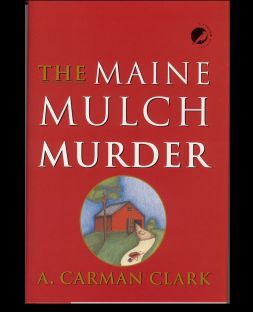
The Maine Mulch Murder by A. Carman Clark
I inherited their passion though not, alas, their ability. I like to joke that I have a brown thumb and a credit card. It doesn’t mean that I don’t try, though. Right now, although I have a lot of writing and organizing on my plate, I cannot stay inside at the computer. In my earlier, more disciplined (or compulsive years), back when I could write six or eight hours a day, I used to make a bargain with myself: an hour of gardening in the cool of early morning, and then back to work. Lately, I’ve been allowing myself more time in the garden. Partly because I’m slow. Partly because I want to be out there in the midst of the plant explosion, peering down at the ground to see what has survived another winter.
Recently, we were away for two weeks and everything doubled in size, especially the weeds. Those “empty” spaces in the garden I was wondering how to fill? They’re gone. The Japanese maple has grown huge. The golden spirea is a bold splash of yellow. The ligularia are threatening to take over the world. My painter’s palette persicaria, with their green, burgundy, and cream colored leaves, are jumping out from the sea of green. I am having a new bed built so I have a better place for lettuce and tomatoes. I know I should be inside finishing the next Joe Burgess, but spring is too magical to only view through a window. The voice in my head asks: What Matters? What are you waiting for? And What will you regret? These messages say: Be outside now, when the world is impossibly alive. And I listen.
May 13, 2024
Your Book is Bigger Than Your Head
Rob Kelley here, talking about how to tackle whole book revision.

In 2018 famed author Walter Mosley was a featured speaker at the Thrillerfest conference in New York City and I got to hear him present. It was not a typical author talk, rather a philosophical consideration of the act of writing. And one of the things that has stuck with me from that talk is his concept the “the novel is bigger than your head.”
In a 2017 Paris Review interview of Mosley, he put it this way: “The novel is bigger than your head. A novel is a gigantic, rambling, incredible thing. All you can do is start.” As with all writing advice, often the most useful advice is that which you are primed to hear at that exact moment in your writing journey.
That summer at Thrillerfest was the moment when I was trying desperately to figure out how to finish the novel that eventually became Raven (High Frequency Press, 2025). The book had existed in a number of iterations, first as science fiction, then again as science fiction, then as several unsuccessful attempts at a thriller. In that form a number of people read excerpts and liked the writing, but I knew it wasn’t finished, wasn’t what I wanted it to be.
Mosley’s concept helped calm in me the fear that I had lost control of my novel and that I wouldn’t get it back. In that Paris Review article, Mosley goes on: “Roy Lichtenstein, who I knew quite well actually, would say the reason most painters fail at art—not at painting, but at art—is because they know what the picture is going to be before they approach the canvas.”
I am not a “pantser.” I do need to outline, but the discoveries that happen mid-book—the character you didn’t know you needed who just shows up on page 49, the piece of dialogue that takes your breath away because where the hell did that come from?—are miraculous. So I can outline all I want but that “shitty first draft” is a living, breathing thing. It writhes and expands and contracts and moves and is, without question, out of control.
So Mosley’s concept helped me see that I could accept that my draft novel would go beyond my ability to easily encompass and tame it. But I had to accomplish it somehow.
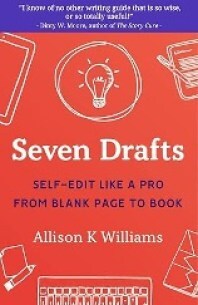 A number of us at the Maine Crime Writers Blog collaborated on a post a couple of weeks ago, “Actually Useful Writing Books,” in which I gave a big shoutout to Seven Drafts by Allison K. Williams.
A number of us at the Maine Crime Writers Blog collaborated on a post a couple of weeks ago, “Actually Useful Writing Books,” in which I gave a big shoutout to Seven Drafts by Allison K. Williams.
Here’s where Williams’ book was incredibly helpful. After that first draft, she outlines a progressive series of edits focused on very specific tasks. First a story draft, in which you dig into the story arc. Then a character draft, in which you attend to the unfolding story for each major character, ensuring that their individual arcs are complete and compelling. A technical draft in which you dig into showing not telling, managing sentence, paragraph, and scene length, fixing verb tenses, removing passive voice, and fixing repeated word frequency. For this draft, I am a fan of the online tool Autocrit, which helps identify some of these issues for you. The next step is a personal copy edit. For this one, my trick is to have it read aloud to me. I use Microsoft Word’s read aloud function, because that sentence that looks right on the page and sounds fine in your head can definitely be missing a word or have an odd syntax you only hear and don’t see.
I have taken her principles and tuned them for the idiosyncratic weaknesses in my prose. As a plotter, I know the big beats and cliff hangers, the threats and the saves. So when I’m drafting I tend to push the action forward, sometimes to the detriment of characterization and scene detail. So after the technical draft I do a “detail draft,” where I consider what my character sees on her walk through the MIT campus, and how cold it is in the big house she shares because it’s too expensive to fully heat.
By that draft the book is definitely bigger than my head, but is also now something richer and fuller than I could have imagined when I first outlined it.
May 10, 2024
Weekend Update: May 11-12, 2024
 Next week at Maine Crime Writers there will be posts by Vaughn Hardaker (Monday), Rob Kelley (Tuesday), Kate Flora (Thursday) and Kaitlyn Dunnett/Kathy Lynn Emerson (Friday).
Next week at Maine Crime Writers there will be posts by Vaughn Hardaker (Monday), Rob Kelley (Tuesday), Kate Flora (Thursday) and Kaitlyn Dunnett/Kathy Lynn Emerson (Friday).
In the news department, here’s what’s happening with some of us who blog regularly at Maine Crime Writers:
Matt Cost will continue his COST TALKS at the Pittsfield Public Library on Thursday, May 16th at 6 p.m. The conversation and reading will be about PIRATES. On Saturday, May 18th, Cost will be Cozy Con East in Groveland, MA from 10 to 3 p.m. He will be on a thriller panel (see, not just cozy) at 10:30 a.m. and will be signing books the rest of the time. The event is hosted by Kensington Books and the Langley-Adams Library.
COZY CON EAST 2024: GROVELAND, MASSACHUSETTS | Saturday. May 18, 2024 | 10:00 am
An invitation to readers of this blog: Do you have news relating to Maine, Crime, or Writing? We’d love to hear from you. Just comment below to share.
And a reminder: If your library, school, or organization is looking for a speaker, we are often available to talk about the writing process, research, where we get our ideas, and other mysteries of the business, along with the very popular “Making a Mystery” with audience participation, and “Casting Call: How We Staff Our Mysteries.” We also do programs on Zoom. Contact Kate Flora
Lea Wait's Blog
- Lea Wait's profile
- 509 followers



